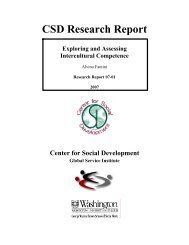Rediscovering social investment in developmental welfare state ...
Rediscovering social investment in developmental welfare state ...
Rediscovering social investment in developmental welfare state ...
Create successful ePaper yourself
Turn your PDF publications into a flip-book with our unique Google optimized e-Paper software.
R E D I S C O V E R I N G S O C I A L I N V E S T M E N T I N D E V E L O P M E N T A L W E L F A R E S T A T E P O L I C I E S :<br />
B A C K T O T H E F U T U R E<br />
on expenditures on <strong>in</strong>-k<strong>in</strong>d, universal, family-focused policies, ALMP, and focus on <strong>in</strong>-k<strong>in</strong>d<br />
universal expenditures) and a DWSP <strong>in</strong>dex (l<strong>in</strong>ear and quadratic). All models controlled for<br />
demographics and country-level GDP and unemployment rates.<br />
The analyses yielded several key if tentative results. First, DWSPs, with the exception of a ma<strong>in</strong><br />
effect for <strong>in</strong>-k<strong>in</strong>d and universal expenditures, are associated with a decrease <strong>in</strong> posttax/transfer<br />
poverty. Second, expenditures on <strong>in</strong>-k<strong>in</strong>d benefits that are universal corroborated the synergistic<br />
relationship between DWSPs and lower poverty. Third, with the exception of a ma<strong>in</strong> effect for<br />
universal and <strong>in</strong>-k<strong>in</strong>d expenditures, DWSPs rema<strong>in</strong>ed salient <strong>in</strong> reduc<strong>in</strong>g market poverty. Fourth,<br />
expenditures on <strong>in</strong>-k<strong>in</strong>d benefits that are universal appeared to be associated with lower poverty.<br />
Fifth, the DWSP Index is associated with lower posttax/transfer and market poverty (though not as<br />
a quadratic function <strong>in</strong> the latter case). Broadly, confirmatory analyses support the cont<strong>in</strong>ued<br />
importance of the regime categorization as well as the relevance of policy variation across countries.<br />
In terms of future directions, the simple analysis based on the conceptual framework outl<strong>in</strong>ed <strong>in</strong> this<br />
paper suggests several more or less applied lessons. First, what happens with<strong>in</strong> <strong>social</strong> expenditure<br />
matters for both posttax/transfer and market poverty. While generosity is important, it is the way<br />
that expenditures are comb<strong>in</strong>ed that deserve central scrut<strong>in</strong>y. Second, DWSPs may both support<br />
earn<strong>in</strong>gs and reduce posttax/transfer poverty. Social policy analyses must make efforts to more<br />
seriously account for productive alongside redistributive effects, <strong>in</strong>corporat<strong>in</strong>g cutt<strong>in</strong>g edge<br />
knowledge on the costs of poverty and underutilization of human potential. Third, DWSPs may<br />
m<strong>in</strong>imize economic distortions and provide a range of goods and services that support productive<br />
economic activity and m<strong>in</strong>imize <strong>social</strong> costs. The tentative results presented here underscore that<br />
more rigorous research is needed.<br />
Discussion and Conclusion<br />
I suggested that reconsider<strong>in</strong>g the disparate ideas of <strong>social</strong> development <strong>in</strong> the context of new issues<br />
fac<strong>in</strong>g the <strong>welfare</strong> <strong>state</strong> made it possible to distill <strong>developmental</strong>ist pr<strong>in</strong>ciples that are relevant to<br />
th<strong>in</strong>k<strong>in</strong>g about productive <strong>social</strong> policy. Among key arguments made <strong>in</strong> this paper, <strong>welfare</strong><br />
<strong>developmental</strong>ism proposes that (1) distribution may make a positive contribution to production, (2)<br />
certa<strong>in</strong> types of poverty entail <strong>social</strong> costs, (3) underutilization occurs and prevention is important<br />
and valuable, (4) the effects of limited <strong>in</strong>formation and distortions are m<strong>in</strong>imized by DWSPs (where<br />
<strong>in</strong>come-based eligibility is m<strong>in</strong>imized and <strong>social</strong> factors are broadly correlated with economic<br />
outcomes), and (5) policy <strong>in</strong>teractions and synergy are important to the productive effects of<br />
DWSPs. The conceptual framework <strong>in</strong> this paper has a range of general implications for how we<br />
th<strong>in</strong>k about and analyze <strong>social</strong> policy <strong>in</strong> an environment <strong>in</strong> which it must <strong>in</strong>creas<strong>in</strong>gly be justified on<br />
the grounds of be<strong>in</strong>g a productive <strong><strong>in</strong>vestment</strong>. I will conclude by mention<strong>in</strong>g three ways <strong>in</strong> which<br />
the <strong>developmental</strong> perspective might impact our th<strong>in</strong>k<strong>in</strong>g. In particular, I will briefly note<br />
implications for policy, research, and practice.<br />
First, clarify<strong>in</strong>g <strong>social</strong> <strong>developmental</strong>ist ideas may <strong>in</strong>crease opportunities for policy-relevant learn<strong>in</strong>g<br />
across societies that are comparatively quite diverse. This study set out to make a conceptual<br />
contribution to understand<strong>in</strong>g whether the same types of <strong>social</strong> policies are related to poverty levels.<br />
I argue that this approach has more policy relevance than a study of <strong>welfare</strong> regimes, as a f<strong>in</strong>d<strong>in</strong>g<br />
that a particular regime has low poverty provides little direction to a country outside that regime <strong>in</strong><br />
that it suggests that a wholesale overturn<strong>in</strong>g of <strong>in</strong>stitutions as well as policies may be required to<br />
achieve lower poverty.<br />
C E N T E R F O R S O C I A L D E V E L O P M E N T<br />
W A S H I N G T O N U N I V E R S I T Y I N S T . L O U I S<br />
42
















